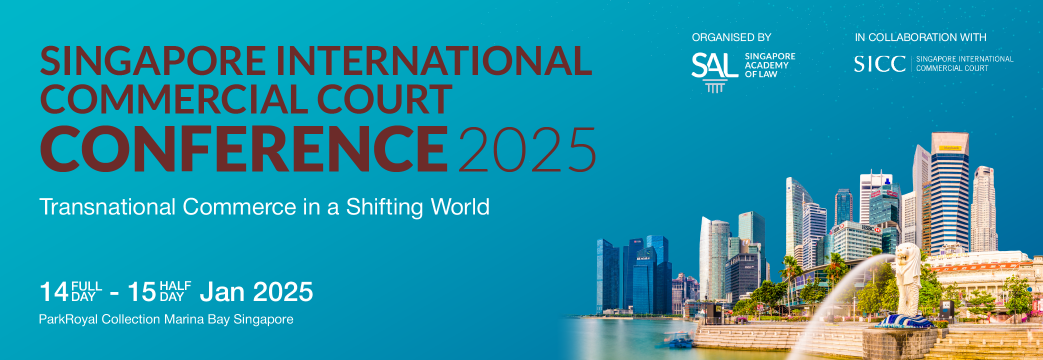SICC CONFERENCE 2025: NAVIGATING THE COMPLEXITIES OF CROSS-BORDER DISPUTE

L-R: Justice Vivian Ramsey, International Judge, Singapore International Commercial Court; Ms Koh Swee Yen SC, Partner, WongPartnership LLP; Mr Duncan Watson KC, Managing Partner (Singapore), Quinn Emanuel Urquhart & Sullivan, LLP; Justice Douglas Jones, International Judge, Singapore International Commercial Court
Ahead of the upcoming Singapore International Commercial Court Conference 2025, we spoke with moderator of Panel Session 2, Justice Ramsey, and a few of the panellists Ms Koh and Mr Watson, who shared their perspectives on some of the main challenges in managing cross border disputes today and Justice Jones, who shared his insights on the Singapore International Commercial Court’s role in managing complex cross-border disputes.
CULTURAL NUANCES
As businesses continue to expand globally, cross-border disputes have become increasingly frequent and complex. Companies must navigate diverse regulatory frameworks, legal traditions and cultural expectations, all of which pose challenges for dispute resolution institutions and practitioners. To successfully address these challenges, it is essential to adopt a nuanced understanding of both legal and cultural dynamics in global dispute resolution.
One of the most significant challenges in cross-border dispute resolution is managing cultural differences. Resolving disputes between parties from diverse legal and cultural backgrounds requires not only legal expertise but also a deep understanding of various conflict resolution approaches. Different jurisdictions prioritize different aspects of the dispute resolution processes, with some focusing on speed and efficiency and others emphasizing formality, mutual respect and deliberative processes.
These cultural variations influence how evidence is presented, arguments are made, and settlement offers are perceived, ultimately shaping the entire resolution process. The need for cultural awareness is crucial in managing these cases, as misunderstandings, delays and mistrust can arise when communication and negotiation styles are not aligned. Sensitivity to cultural expectations is essential to ensure that all parties feel respected and that the process remains fair, ultimately leading to satisfactory outcomes.
AI AND TECHNOLOGY
Artificial intelligence (AI) is emerging as a powerful tool in managing the increasing complexity of cross-border disputes. AI technologies can streamline processes by sorting case data, predicting outcomes and assessing risks. Through machine learning algorithms, AI-powered platforms help identify relevant precedents across different legal systems, significantly reducing time and costs. These tools are revolutionizing the dispute resolution process by facilitating document submissions, virtual hearings and tracking case progress from any location.
However, as Justice Ramsey, Ms. Koh, and Mr. Watson noted, AI cannot replace the nuanced understanding of human behaviour and cultural dynamics that experienced lawyers bring to the table. While AI can enhance efficiency, practitioners must verify its outputs for accuracy and relevance, ensuring a balance between technology and cultural sensitivity to achieve reliable outcomes.
SINGAPORE'S ROLE: MANAGING COMPLEX INTERNATIONAL DISPUTES
Singapore has positioned itself as a key player in managing complex cross-border disputes through the Singapore International Commercial Court (SICC).
Justice Jones highlighted the SICC’s unique role in managing challenges common in arbitration, such as third-party involvement. Unlike arbitration, parties can submit to SICC’s jurisdiction at any stage, even after a dispute arises, facilitating multi-party international cases with adaptable rules and enforceability.
Further, the SICC’s collaboration with the Singapore Mediation Centre to establish INTEGRAF[1] and with the Singapore International Mediation Centre to establish the litigation-mediation-litigation (LML) framework strengthens its role in promoting amicable, efficient resolutions to complex disputes. These initiatives provide viable alternative dispute resolution frameworks by offering integrated, enforceable solutions for multi-party, cross-border commercial conflicts.
Join Us for the Panel Discussion

Fallout: Tooling Up (And Teaming Up) To Manage Complex Technical Disputes will feature Justice Vivian Ramsey, International Judge at the Singapore International Commercial Court, moderating a session with panellists Justice Douglas Jones, International Judge at the Singapore International Commercial Court; Ms Marion Smith KC, 39 Essex Court Chambers; Professor Jan Paulsson, Judge at the Bahrain Court of Cassation; Ms Koh Swee Yen SC, Partner at WongPartnership LLP; and Mr Duncan Watson KC, Managing Partner (Singapore) at Quinn Emanuel Urquhart & Sullivan, LLP.
They will discuss challenges and strategies in cross-border dispute resolution and the tools, techniques and collaborations that are influencing the future.
Registrations for the SICC Conference 2025 are open here.
[1]The Integrated Appropriate Dispute Resolution Framework (INTEGRAF), developed by the Singapore Mediation Centre in collaboration with the Singapore International Commercial Court, is a framework designed to address complex disputes arising from large projects or commercial transactions. INTEGRAF offers multiple dispute resolution methods and allows for the establishment of a Conflict Avoidance Board (CAB) who will guide parties through the dispute resolution processes. With the SICC-INTEGRAF Model Clause, parties are able to designate the SICC as the forum of last resort. This approach facilitates efficient, comprehensive dispute resolution, particularly for multi-party, cross-border cases, ensuring coordinated and enforceable outcomes.






